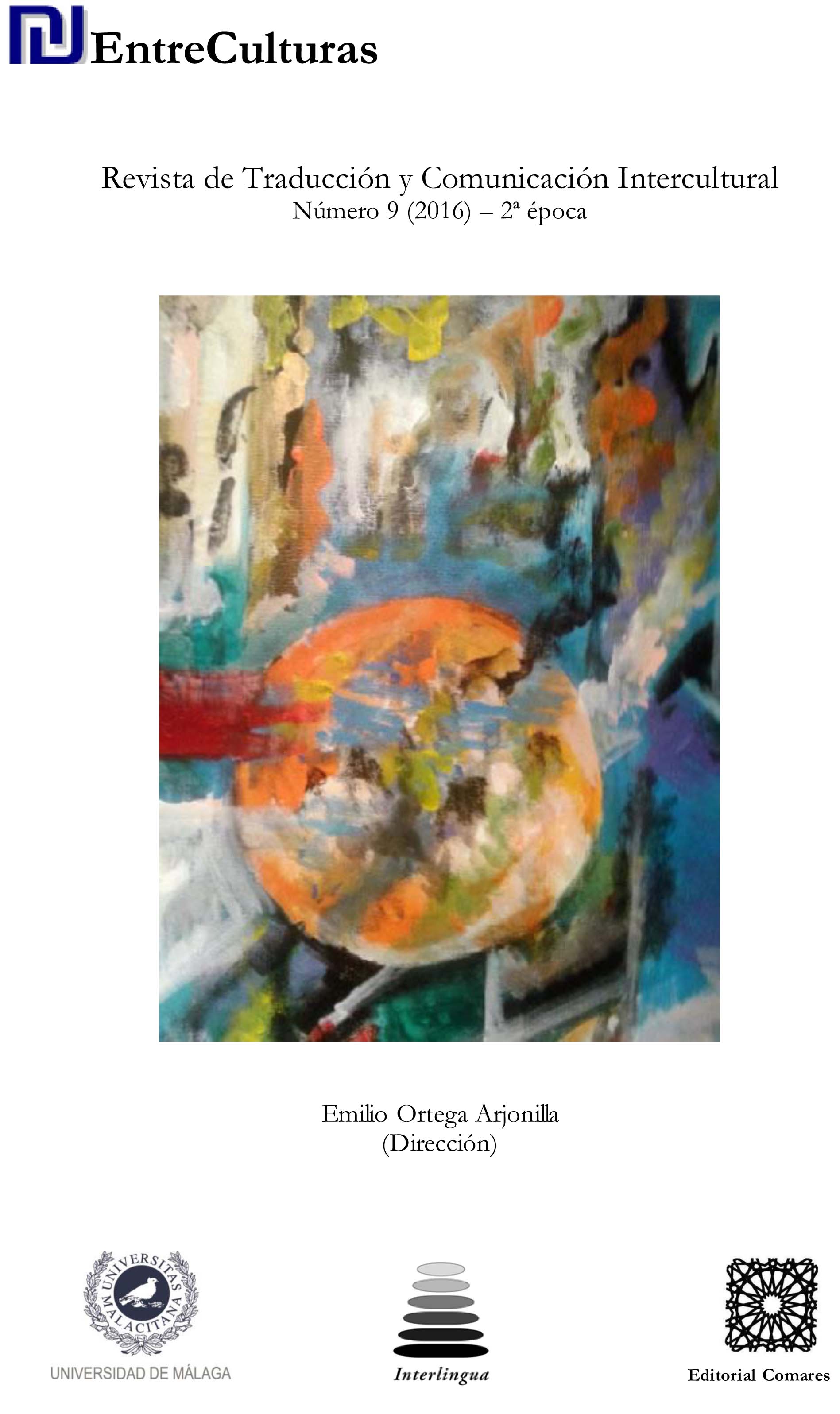EL ENFOQUE COGNITIVO CONCEPTUAL DE TIEMPO EN LA METÁFORA: UN ESTUDIO COMPARATIVO ENTRE ÁRABE Y ESPAÑOL
DOI:
https://doi.org/10.24310/Entreculturasertci.vi9.11272Palabras clave:
Metáfora, Metáfora cognitiva, Teoría metafórica conceptualResumen
Desde la aparición de la teoría de la metáfora conceptual (TMC en adelante) en 1980, la concepción tradicional de la figura de la metáfora contrasta con la de los estudios más recientes en torno a la misma. A pesar de lo que revelan estos estudios, la metáfora es muchas veces vista como una mera parte del lenguaje cotidiano. Otras veces, sin embargo, se asocia sólo al lenguaje literario.
En este artículo vamos a hacer un estudio comparativo mediante el desarrollo, al menos parcialmente, de un análisis comparativo de las metáforas conceptuales de tiempo entre dos lenguas (no relacionadas entre sí por tener orígenes tan distintos) como son el árabe y el español. Por otra parte, la presente investigación trata de mostrar cómo el concepto abstracto del tiempo se conceptualiza en términos más concretos, es decir, en ambos idiomas, se conceptualiza el tiempo como una entidad en movimiento.
Descargas
Métricas
Citas
Borges (1921). «Jorge Luis. La metáfora», Revista Cosmópolis. Seção Apuntaciones críticas, 35. Madrid.
Callaghan, M. (2004). «Ail the years of her life», en. B. Bacz: Texts for analysis (p. 3-5). Québec, Laval University Press.
Coulson, S. (2005). «Metaphor and Conceptual Blending», en Brown, Keith (ed.), 32-39.
Evans, V. (2004). The Structure of Time: Language, Meaning and Temporal Cognition. Sussex. Faucnnier, G. (1994). Mental Spaces: Aspects of Meaning Construction in Natural Language. New York, Cambridge University Press, p. 240.
Fraisse, P. (1956). Psychologie du Temps. Paris.
Katz, A. y Mio, J.S (1996): «On Interpreting Statements as Metaphor or Irony: Contextual Heuristics and Cognitive Consequences», en (Eds.) Metaphor: Implications and Applications, 1-22.
Katz, A. (1998). «Figurative Language and Figurative Thought: A Review», in Katz, A. et. Al (eds.). Figurative Language and Thought. Oxford & New York: Oxford University Press.
Lakoff, G. (1993). «The Contemporary Theory of Metaphor». En Ortony, A. (ed.) Metaphor and Thought. Cambridge, Cambridge University Press, 202-251.
Mair, C. (2002). «Three Changing Patterns of Verb Complementation in Late Modern English: A Real-Time Study Based on Matching Text Corpora», English Language and Linguistics 6 (1), 105-131.
Malmkjar, K. y Anderson, J. M. (2006). The Linguistics Encyclopedia. London and New York, Routledge. Nelson, G. (1968): Languages of Art: An Approach to a Theory of Symbols, Indianapolis: The Bobbs-Merrill Company.
Newmark, P. (1988). A textbook of translation. New York, Prentice-Hall International.
Ocksue, P. (2009). «The Issue of Metaphor in Literary Translation: Focusing on the Analysis of a Short Story Translation», en Journal of Language & Translation 10.1. 155–175
Ramachadran, V. S., Hubbard, E. M. (2001). «Neural cross-wiring, synaesthesia and metaphor», Poster presented at the 8th Annual Meeting of the Cognitive Neuroscience Society, New York. Seitz, J. A. (1998). «Nonverbal Metaphor: A Review of Theories and Evidence», Genetic, Social and General Psychology Monographs 124(1), 95-119.
Semino, E. (2004). «Methodological Problems in the Analysis of Metaphors in a Corpus of Conversations about Cancer», Journal of Pragmatics, 36, 1271-1294.
Soriano, C. (2005). The Conceptualization of Anger in English and Spanish: a cognitive approach. Tesis doctoral. Universidad de Murcia.
Steen, G. (1999). «From Linguistic to Conceptual Metaphor in Five Steps», in: Gibbs, Raymond W./Steen, Gerard J. (eds.). Metaphor in Cognitive Linguistics, Amsterdam, 57-77.
Sweetser, EVE. (1990). From Etymology to Pragmatics: The Mind-as-Body Metaphor in Semantic Structure and Semantic Change. Cambridge, CUP.
Taylor, J.R. (2006). «Cognitive Semantics». In Brown (ed.), 569-582.
Turner, M. (1989). Death is the Mother of Beauty: Mind, Metaphor, Criticism. Chicago, CUP.
Descargas
Publicado
Cómo citar
Número
Sección
Licencia
Todos los contenidos publicados en Entreculturas. Revista de traducción y comunicación intercultural están sujetos a la licencia Creative Commons Reconocimento-NoComercia-Compartirigual 4.0 cuyo texto completo puede consultar en <http://creativecommons.org/licenses/by-nc-sa/4.0>
- Se pueden copiar, usar, difundir, transmitir y exponer públicamente, siempre que:
- Se cite la autoría y la fuente original de su publicación (revista, editorial y URL de la obra).
- No se usen para fines comerciales.
- Se mencione la existencia y especificaciones de esta licencia de uso.
Los derechos de autor son de dos clases: morales y patrimoniales. Los derechos morales son prerrogativas perpetuas, irrenunciables, intransferibles, inalienables, inembargables e imprescriptibles. De acuerdo con la legislación de derechos de autor, Entreculturas. Revista de traducción y comunicación intercultural reconoce y respeta el derecho moral de los autores/as, así como la titularidad del derecho patrimonial, el cual será cedido a la Universidad de Málaga para su difusión en acceso abierto. Los derechos patrimoniales, se refieren a los beneficios que se obtienen por el uso o divulgación de las obras. Entreculturas. Revista de traducción y comunicación se publica en open access y queda autorizada en exclusiva para realizar u autorizar por cualquier medio el uso, distribución, divulgación, reproducción, adaptación, traducción o transformación de la obra.
Es responsabilidad de los autores/as obtener los permisos necesarios de las imágenes que están sujetas a derechos de autor.





7.png)
